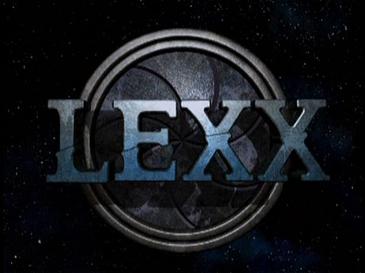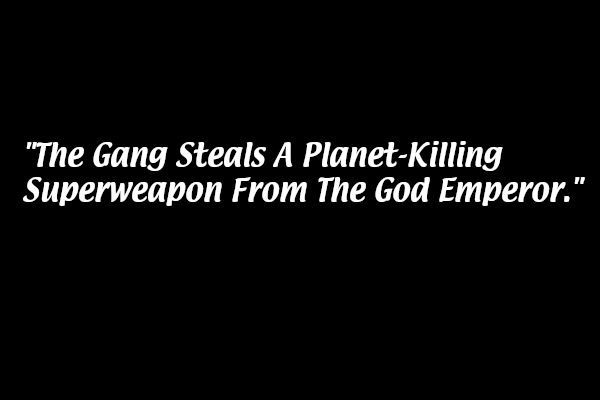
[Spoiler warning for the entire series. I'm going to be discussing plot points from the entire show as this section of my site develops, and spoiling the entire storyline as I go. Reader discretion is advised.]
I honestly don't know how this is getting written before the Dark City essay I was working on. But seeing as how I am completely at the mercy of my ADHD hyperfocus, it's happening whether I wanted it to or not. So here goes.
Lexx was a show I watched between 2000-2001 on the Sci Fi channel (way before it was renamed to Syfy.) And from the beginning, I wasn't quite sure I liked it. But I watched it religiously for months, though at the time I really couldn't have told you why. I was also a regular visitor to fan websites like Sadgeezer's Guide. Because apparently, a huge part of the fandom experience on the early Web 1.0 Internet for a lot of people was reading Episode Guides for TV shows we were all actively watching for some reason. I don't know why this is, but we all did it.
(Actually, it was probably because this was before most people had high-speed internet, and before streaming. You couldn't just binge a show from the beginning back then if you started watching in the middle of its run. Episode Guides were a way to get caught up. Or if you wanted to experience an episode again and you hadn't recorded it, Episode Guides were all you had until the show was re-run, or released on physical media. The writers of these online Episode Guides were also fans, who often became "Big Name Fans" due to their involvement with the fandom via their websites. Their takes on an episode could provide interesting context, or trivia, or details that a viewer may have missed on their initial viewing.)
Most of my friends avoided the show, or said it was "too weird" for them. It either wasn't the standard sci-fi adventure show they wanted it to be, or it wasn't the sci-fi softcore porn show they wanted it to be, or they didn't get the humor. It was like we collectively couldn't wrap our heads around the idea of a storyline which cohesively contained all of these elements yet, even though we'd all seen the animated flm Heavy Metal multiple times by then.
I heard it frequently dubbed "The Rocky Horror Picture Show IN SPACE." which was no doubt helped along by the presence of Tim Curry and Barry Bostwick ("Brad!") in the episodes in which they appeared. It sometimes reminded me of Red Dwarf - a show which was universally beloved amongst my peer group, which we quoted constantly. But Red Dwarf was not this weird. And even though it had its moments, it was nowhere this dark. A good comparison I've heard more recently "Warhammer 40K (especially the first season) meets Barbarella meets Mad Max meets Heavy Metal, with shades of It's Always Sunny In Philadelphia IN SPACE thrown in." (One friend of mine recently referred to it as "Warhammer Horny K.")
On a surface level, to continue the Warhammer 40K analogy: the whole series could be summed up as "Yeah, this is pretty much what would happen if these specific people stole a planet-killing superweapon from the God Emperor, and escaped with it."

Because that is the plot, in a nutshell: our protagonists (so to speak) steal a planet-killing spaceship, and ride it around between two parallel universes (the Light Universe and the Dark Zone) like they stole it. They don't immediately turn it against The Empire (aside from one security base that got in their way) and they don't collaborate with The Resistance. They basically just wander around in search of some kind of safe permenant refuge, and physical gratification - and not even in that order.
The show had a reputation for wackiness, and not taking itself too seriously; but there's a cynical, grimdark undercurrent running underneath the whole thing from the very beginning that discomfited me at times. I was already used to grim, dystopian, or fatalistic narratives in books, both fantasy and science fiction. I was already fan of Michael Moorcock by this point, and Elric of Melnibone and Dorian Hawkmoon were already old friends by the time I was first tuning in to LEXX. But the show often seemed subversively nihilistic, which set it apart from the rest of the 1990s Sci Fi TV landscape. Most of the typical TV fare at the time was your traditionally heroic, good-versus-evil, heroes' journey-type narratives. And LEXX was decidedly NOT that.
If you had asked me back then, I couldn't have articulated what it was that made me tune in every week. In fact, there were times when I wondered if I was actually watching the show if I liked it, or if it was because I couldn't look away. But something about it kept me watching - right up until a certain morning in September 2001, after which I really couldn't handle its unique brand of nihilism played for laughs anymore. Not for a good long while, anyway. But looking at it in hindsight, there were aspects of the show's themes which seemed especially relevant to things which were going on in the real world at the time, and even moreso in the current day. I think that back in 2000, I wanted to look at things through a lens of optimism, not cynicism. But cynicism was where we were headed, and it was probably would have been better for me to accept that fact sooner rather than later. Because I would soon be forced to do so, regardless.
And even after I stopped watching, the Lexx Escape Theme or Opening Theme would still pop into my head at odd moments; or I'd remember the words to the Brunnen G Battle Hymn. Maybe I was done with LEXX at that time, but it clearly wasn't done with me.
The show didn't look like anything else on the air at the time. Some critics scoffed at CGI that was "bad" even by the standards of the late 1990s. But upon a recent rewatch of the series, I was struck by how much the dated effects seem to work for it somehow? I think the atmosphere it conveyed is one of the reasons that it drew such a cult following. There's something about it to me that seems evocative of the "New Wave" of the 1960s and 1970s Sci-Fi literature, when Science Fiction started to get weird and surreal and maybe a little edgy. When authors felt like they could experiment and push boundaries, and maybe even get things dirty at times.
The series could be seen as an exploration of what people do and what they become when attempting to functon within corrupt, decaying, and dysfunctional social structures, and what happens to them after those systems start to fall apart, and they are thrust into a wider universe that does not care about the existence of life or humanity at all in the grander sceme of things. This is what The Prophesy from the first season could possibly be seen as a metaphor for: corrupt systems are doomed to fail, because they ultimately aren't sustainable. We don't need a Time Prophet to tell us that: it's the most predictable thing in the universe.
"This has happened before, and it will happen again."
And when the collapse happens; when we are facing futility and entropy and the meaningless of existence; when we are facing the inevitable collapse or destruction of an entire empire, an entire planet, or an entire universe; when nothing we do seems to matter; then paradoxically, all that matters is what we do. Whether that's taking to our battleships and singing our battle-hymns as we fly to our doom, or frantically searching for the nearest space-brothel: either in defiance, or in attempted avoidance of the inevitable.